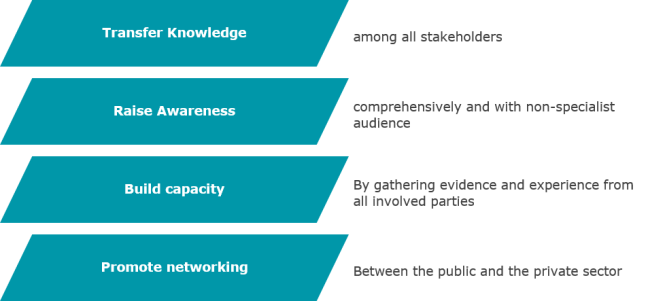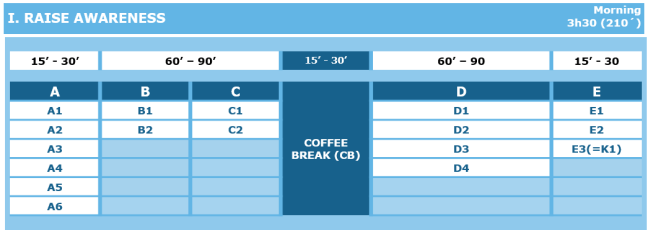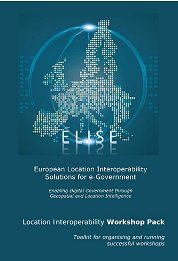Why a workshop pack?
We aim to go beyond traditional and less effective methods for transferring knowledge into more active and hands-on experience methods.
When participants say, write and perform activities, it has been proved to be the most effective method to acquire knowledge and achieve higher-order thinking skills.

The ELISE workshop pack is a rich toolkit that empowers facilitators to build their own workshop.
Who is it for?
| Single: Public sector organisation | 
|
| Combination of different public sector organisation | 
|
| Combination: of both private and public sector organisations | 
|
Objectives
This resource aims to be a stand-alone tool, easy and flexible to use when organising workshops in virtual or physical contexts.

In terms of Location Interoperability, the ELISE Workshop Pack has two main roles:
1.introduce elements of ‘geospatial thinking’
2. aim participants to ask questions about data-centricity and the role of geospatial data and technologies.
Design requirements
Some of the requirements when designing the Workshop Pack were:



The modular and flexible design allows the workshop pack to be reused in any domain.
Workshop composition
The workshop pack consists of a grid of interchangeable building blocks that adapt to the audience and the experience and focus of the facilitator.
Through a list of exercises and activities from which the facilitator can choose from, the main goals are to raise awareness during the morning session and create synergies in the afternoon.
- To raise awareness: Activities from blocks A to E are designed to explore topics and build confidence among the participants.

- To facilitate networking: Blocks F to K identify partnerships and cross-pollination opportunities.

Activities and building blocks
The learning segments described above can be adapted to match the audience knowledge by assembling interchangeable building blocks:

| Activity Block | Modules | Interchangeable modules |
|---|---|---|
| A | Initiating | A1-A6 |
| B | Entering the field of knowledge | B1-B2 |
| C | Learning the basics | C1-C2 |
| D | Dive in | D1-D4 |
| E | Debriefing | E1-E3 |
| F | Energising | F1-F3 |
| G | Geospatial in practice | |
| H | Hands-on co-design & networking | H1-H5 |
| I | Hands-on sharing | I1-I2 |
| J | Exploring further learning | J1-J3 |
| K | Final Feedback and closing | K1-K4 |
By opening each dropdown menu, you will find a set of PDF files with activities and exercises to apply to your workshop design.
Morning Session: Raise awareness
Explore questions and topics such as spatial literacy, the relevance of geospatial data for policy cycles or service delivery, or the relevance of data interoperability and digital transformation in their domain

A1 Map the Audience
This activity allows the participants to present themselves more dynamically, offering the ideal opportunity to acknowledge the diversity within the group.
A2 Yes, and…
A simple exercise to learn about collaborative communication by experiencing both the power of resistance and acceptance.
A3 5xWhy
This is a slight variation of an exercise used within the Toyota Motor Corporation that has two people interviewing each other, asking the same question five times in a row: "Why did you come here today?"
A4 Check-in
Providing the simplest participatory way of opening a collaborative journey, this activity consists in circulating a check-in question within the group.
A5 Ground Rules
Implement a set of refreshing practices inspired by other cultures and ancestors as portals to better collaboration. This will help deliver the workshop as a fun and memorable experience and overcome the most common obstacles preventing activities from flowing seamlessly.
A6 Opening Ceremony
Set up a symbolic gate to step into the experience by allowing space for pausing, tuning, setting intentions, and learning how to operate within the workshop's time-space capsule.
B1 Data Explorers
A gamified activity for lowering participants' resistance to the apparent complexity of the workshop theme. It provides the opportunity to start "playing" with spatial data and achieve the most relevant concepts in an intuitive and real-life-related way.
B2 Future Mapping
Future Map aims to create a shared view of industry trends in the recent past, present, and future. Participants map key trends from the past year, current year, and three years ahead, then review the map, identify patterns and discuss the relevance of different trends.
C1 Call my Bluff
Inspired by a popular BBC quiz show of the 1960s, this gamified activity revolves around figuring out the missing word/concept from the 3 definitions provided, of which only one of them is true.
C2 Concepts sorting
Inspired by the card sorting method, this activity is designed as a quick and easy way to spark curiosity around core concepts and have an active and playful dynamic that helps to organise that knowledge collaboratively.
D1 KJ Technique
The KJ-Method, allows groups to quickly reach a consensus on priorities of subjective, qualitative data. It focuses the group on the task at hand and is excellent at eliminating unnecessary discussion and distractions from the goal.
D2 Context Map Canvas
Introduce the context map to the group. Explain that the goal of populating the map is to get a sense of the big picture in which your organization operates.
D3 Thematic Presentation
Present a movie or an inspiring PowerPoint about Smart Cities or another trend in action which may reveal the overlapping and interlacing relation between the fields of spatial data and digital transformation of public services.
D4 How might we?
Every problem is an opportunity for design, by framing challenges as "How Might We" questions, the team will be paving the road for innovative solutions.
E1 Key Ideas Summary
Presentation with key concepts addressed until that moment to wrap up the morning session and to summarise what the participants should retain for the afternoon session.
E2 Dotmocracy
Dotmocracy is a simple and visual method for group prioritisation/ decision-making. It supports a group to see quickly which options are most popular or relevant. The ideas are written on post-its and stuck up on a wall for the whole group to see. Each person votes for the options they think are the strongest.
E3 Sharing Circle
A ceremonial way to open or close a loop, inspired by key elements of several ancient tribal cultures' conversation practices.
Afternoon Session: Networking
Identifying and tapping into partnerships and cross-pollination opportunities by exposing participants to examples and cases from ELISE outputs or EULF Blueprint.
F1 Bang
Bang is a group game, played in a circle, where participants must react quickly or face elimination. One person stands in the middle of the circle as “the sheriff”, pointing at other players who must quickly crouch while those on either side of them quickly “draw” and shout the other person’s name.
F2 Linking thoughts
This is a fast, fun, and easy to run energiser that is in the safe zone for most people yet makes you feel empowered and connected. It starts with people in a circle and a fluffy ball of wool yarn.
F3 Three brain warm-up
A very powerful and popular warm-up with physical, cognitive, and spatial elements, where participants have fun failing.
G Case studies and/or presentation
A presentation, maybe including a movie, with the most relevant, insightful and inspiring examples from a specific project/program.
H1 Team Canvas (lite)
The Team Canvas is Business Model Canvas for teamwork. It is an effective technique to align teams about their goals, values, and purposes and help team members find their roles.
H2 Value Proposition Canvas
The Value Proposition Canvas makes explicit how you are creating value for your customers. It helps you to design products and services your customers want. It is tied to the Business Proposition Canvas.
H3 Business Model Canvas
The Business Model Canvas is a high-level approach to co-create and visualize the key components of a business model to test and refine various options iteratively. A way of explicitly showing how value is being created and captured and thinking about the several possibilities where a solution might be useful.
H4 SWOT Analysis (or COIN)
This exercise can work as an opening or closing exercise. It is useful for framing discussions at “problem-solving” meetings, or as a way to brainstorm aspirational steps toward a vision or as an opener to new possibilities. A version such as COIN can be applied – Challenges, Opportunities, Insights and Needs.
H5 World Cafe
Begin with a welcome and an introduction to the World Café process, setting the context, sharing guidelines, and putting participants at ease. You can use a single important question from multiple perspectives or structure the process to include several questions on a given topic.
I1 Group debrief
The easiest way to widely debrief results from different teams at once, for better controlling content and time (widely share groups' results from the afternoon project)
I2 Elevator Pitch
Let teams share their own assessment of the project in a timeboxed way (widely share groups' results from the afternoon project).
J1 Presentation of learning resources
A short presentation to be shared with the audience, including links and screenshots of the core online resources (e-learnings, documentation and supporting communities).
J2 Guided tour
A guided tour to the core online resources (e-learnings, documentation and supporting communities).
J3 Scripted walkthrough
The same as J2 - Guided Tour, though performed by the participants by following a script.
K1 Sharing Circle
A ceremonial way to open or close a loop, inspired by key elements of several ancient tribal cultures' conversation practices.
K2 Session Feedback Form
Participants answer the feedback forms to understand better how well the workshop responds to the objectives for which it was created.
K3 Closing ceremony
“Close the loop" by joining loose ends, recognising paths that have been set in motion on this journey and celebrating what has been experienced, learned, initiated and lived together through a symbolic passage from the workshop territory to the outside world.
K4 Check-out
Providing the simplest participatory way of closing a collaborative journey, this activity consists of circulating a check-out question within the group.
Facilitator experience and focus: recommended settings

We recommend the following workshop configuration scenarios according to the event's objectives and the facilitator's experience.
Explorer
This is a more accessible setting for less experienced facilitators, tailored to audiences unfamiliar with the spatial data interoperability theme.
Practitioner
This is a slightly more demanding setting for facilitators with some experience but still suited to audiences unfamiliar with the core themes of the workshop.
Master
Demanding configuration in the preparation of space and resources requires a more self-confident and experienced facilitator: it is better suited to more heterogeneous and knowledgeable audiences, focusing less on concepts and collaborative exploration.
Tips and recommendations
When preparing a workshop, careful preparation is essential.
Find here a quick guide of DO's and DONT's and a workshop checklist to run a successful workshop
Physical and virtual settings
The workshop pack modules can be applied in both physical and virtual settings.
This document provides guidance on which activities adapts better or not in a virtual setting.
It also promotes a methodology to transform a module from physical to virtual format, with tips and examples to follow.
Explore the Workshop Pack
Explore the complete Workshop Pack and download it fully here.





